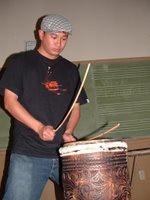Fund Cut Silences ‘kulintang’
By Philip Dominguez MercurioSAN FRANCISCO — ETHS 545, a class that explores the art of kulintang (gong) music from the Southern Philippines, is getting the ax this coming semester.
This was a result of Calif. Gov. Arnold Schwarzenegger’s moves to borrow $2 billion in funds from California’s already strained education budget. Similar culturally rich classes are also being eliminated.
Seeing no other option, San Francisco State University’s Ethnic Studies Department decided to terminate the course, leaving many students disappointed and angry.
“I’m really disappointed,” said Maribelle Navarez. “I thought this class was an opportunity for a lot Filipino American students who otherwise would not be exposed to certain cultural things to really explore subjects that you don’t get from family or from home,” she said.
Jocelyne Ampon, one of ETHS 545 teacher’s assistants, expressed a similar view. “I’m upset because now the class is finally becoming popular among students who aren’t Filipino, in Ethnic Studies or in the Music department.” she said. “These students are taking the class because they see there is something else other than classical musical taught here.”
ETHS 545 is taught by Master Danongan Sibay Kalanduyan, expert and scholar on the Maguindanao style of tribal kulintang music. He was born in the Mindanao province of Cotabato and grew up in an environment of traditional Mindanao music.
A Rockefeller grant in 1976 brought him to the U.S and he has been teaching kulintang music in universities since.
“I feel that transmitting the knowledge I possess is important for Filipino Americans everywhere, not only to preserve what may be the only authentic Filipino musical form, but also to encourage Filipino Americans to maintain contact with their cultural heritage,” he said in a published interview.
He further explained, “It is a musical tradition we’ve had in the Philippines before we were ever conquered by the Spaniards.
It’s a pre-colonial, pre-Islamic tradition of the Filipinos that most Filipinos nowadays are not familiar with. So basically, the class is here to educate our fellow Filipinos since this was their own heritage before any foreigner came to our country.”
Such was the case for Filipinos like Ampon, who learned a good deal about her own heritage from Kalanduyan’s course.
“The class is really important to me because I wanted something more involved in our music and culture. And when I found out about this class, I was like, Wow. That’s perfect, because I always wanted to learn how to play and this was a perfect chance,” she said.
SFSU has been offering the course for five semesters. About 25 students are enrolled in the class.
“Living in the United States for 12 years,” said Kristine Cura, one of Kalanduyan’s students, “I grew up exposed mostly to western or more specifically, American culture. Now that I am an adult, I yearned to learn more about Philippine culture and taking kulintang class has given me the opportunity to do so.”
Unfortunately, the series of budget cuts in education has led to the drying up of funding for smaller and highly specialized courses.
The SFSU said budget cuts are a reality the school faces every day.
“At this point, all I could say is that each of our chairs and directors are faced with difficult decisions based on limited budgets. Long-term, of course we need to restore full funding to public education,” said Ken Monteiro, Acting Dean of the College of Ethnic Studies.
“When Schwarzenegger said that fees were going to go up and education funding had to be temporary reduced, we knew we were really going to get hurt,” said Daniel Phil Gonzales, a Professor of Asian American Studies. “I mean, we’re still in the middle of budget cuts now. You’ve been seeing all the discontinuous wiping out of whole departments.”
Ultimately, Schwarzenegger restored part of the $2 billion budget cuts, but the amount did not go to Kalanduyan’s class.
Kalanduyan said he would like to continue teaching the class at San Francisco State “if the university would like me to continue.”
“What I’ll miss of course is seeing the faces of students who are very curious and interested in knowing more about the arts and culture of the Filipinos, specifically the people of Mindanao who keep and continue to strongly practice these arts.
What’s great is realizing these students are not only interested in just learning the music but also understanding the history of the music, the dance and how they can learn it and pass it on to younger Filipinos and other students interested in learning about Philippine culture heritage,” he said wistfully.
“There’s no other place to learn this but from Master Kalanduyan,” said Ava Tong, a long-time apprentice of the course. - PDM
See this article,"Fund Cut Silences ‘kulintang’" in Philippine News. Click here























































































































































































<< Home